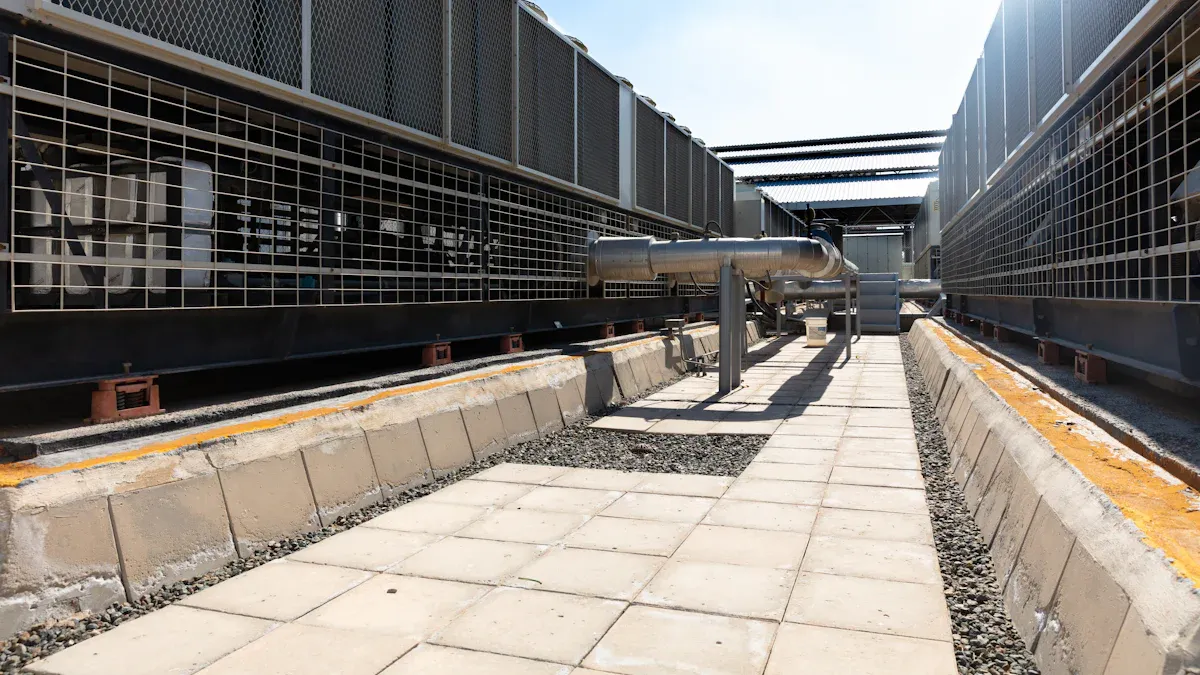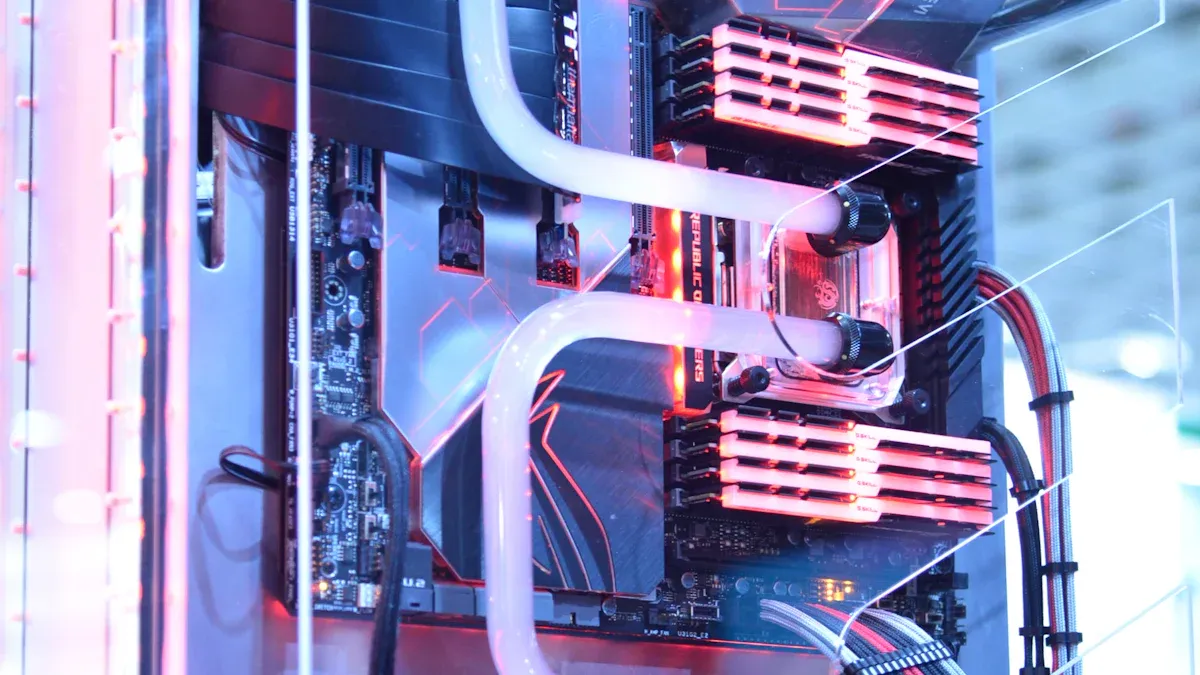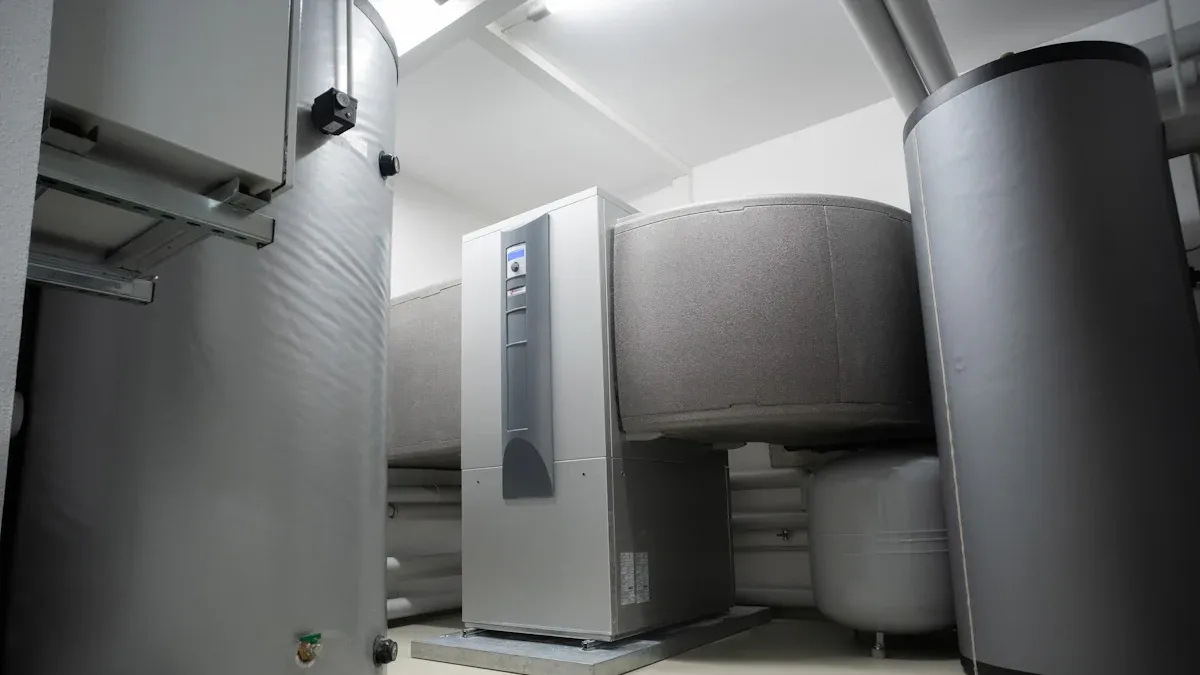
Industries in Russia face unique challenges due to extreme weather conditions and diverse operational demands. Customized Temperature solutions address these challenges by ensuring precise control over environmental conditions. Systems like the HMC HHC Process Temperature Control System enhance operational efficiency and maintain Constant Temperature levels, which are critical for consistent product quality and reliable performance in harsh climates.
Key Takeaways
- Special temperature systems save energy and cut production costs.
- Keeping steady temperatures makes better products and less waste, gaining trust.
- These systems work well in Russia’s tough weather, staying reliable.
Benefits of Customized Temperature Control

Enhanced efficiency and cost-effectiveness
Customized Temperature solutions play a pivotal role in optimizing energy use across industries. By maintaining precise temperature levels, these systems reduce energy waste and improve process efficiency. Industries such as manufacturing and food processing benefit significantly from advanced temperature control technologies, which minimize emissions and enhance operational performance.
Effective temperature control systems contribute to energy savings by ensuring combustion efficiency and optimizing heat recovery processes. Regulatory standards increasingly push industries to adopt these technologies, further lowering operational costs.
Key advantages include:
- Reduced energy consumption through accurate temperature measurement.
- Enhanced process efficiency, leading to lower production costs.
- Improved sustainability efforts by minimizing emissions.
Improved product quality and consistency
Maintaining consistent temperature levels is essential for industries that prioritize product quality. Customized Temperature systems ensure uniformity in production processes, which is critical for sectors like pharmaceuticals, food processing, and chemical manufacturing. Accurate temperature control minimizes product spoilage and guarantees compliance with industry standards.
- Accurate temperature records demonstrate commitment to product safety and quality.
- Consistent temperature control reduces waste and enhances customer trust.
- Optimized processes lead to better product reliability and market competitiveness.
Adaptability to extreme Russian climates
Russia’s harsh climate demands robust temperature control solutions tailored to local conditions. Customized Temperature systems are designed to withstand extreme temperatures, ensuring uninterrupted operations in industries such as oil and gas, heavy manufacturing, and food storage.
Advanced temperature control technologies enable industries to adapt to fluctuating environmental conditions, safeguarding equipment and maintaining operational efficiency.
Industries benefit from:
- Reliable performance in sub-zero temperatures.
- Protection of sensitive equipment from temperature-related damage.
- Improved operational stability in challenging environments.
Applications of Customized Temperature Solutions

Oil and gas industry
The oil and gas sector relies heavily on precise temperature control to ensure operational efficiency and environmental compliance. Customized Temperature solutions play a critical role in this industry by optimizing processes and reducing emissions.
- Proper temperature management prevents over-firing, lowering CO2 and NOx emissions.
- Accurate control minimizes waste-related emissions by ensuring product quality and reducing defects.
- Advanced systems enhance energy efficiency, reducing the environmental impact of operations.
| Key Findings | Description |
|---|---|
| Importance of Temperature Control | Critical for managing transportation and storage of oil and gas. |
| Impact of Raw Material Composition | Influences temperature fields, affecting overall efficiency. |
| Application of Distributed Systems | Enables analysis of complex systems for improved performance. |
Manufacturing and heavy industries
Customized Temperature solutions are indispensable in manufacturing and heavy industries. These systems ensure optimal material flow, prevent defects, and maintain compliance with safety standards.
- Injection molding and metalworking benefit from precise temperature control, ensuring proper material flow.
- Paint shops and curing ovens achieve better coating adhesion through accurate curing temperatures.
- Combustion efficiency improves with precise temperature management, minimizing energy waste.
- Heat recovery systems optimize energy use, reducing costs and environmental impact.
Food processing and storage
Temperature control is vital in food processing and storage to maintain safety and quality. Customized Temperature systems help industries comply with regulatory standards and prevent spoilage.
| Evidence Type | Description |
|---|---|
| Microbiological Research | Pathogens multiply rapidly between 41°F and 135°F, doubling in 20 minutes. |
| Regulatory Requirements | FDA guidelines outline temperature controls to prevent pathogen growth. |
| Food Safety Management | Validated parameters ensure food safety and reduce contamination risks. |
| Epidemiological Data | Adherence to standards reduces foodborne illness risks significantly. |
Pharmaceutical and chemical sectors
Temperature control is essential in the pharmaceutical and chemical industries to maintain product stability and safety. Customized Temperature solutions ensure sensitive products remain within required temperature ranges during storage and transport.
Pharmaceutical cold chain monitoring safeguards the quality of vaccines and biologics by maintaining specific conditions throughout the supply chain. Deviations from recommended ranges can compromise product effectiveness, making precise temperature control indispensable for these sectors.
Key Considerations for Implementation
Industry-specific requirements
Each industry has unique temperature control needs that demand tailored solutions. Manufacturing processes, for instance, rely on precise temperature measuring to ensure product quality and compliance. Minor deviations can lead to defects or failures, especially in assembly lines. By integrating temperature monitoring into digital work instructions, companies automate validation processes, ensuring checks occur at critical moments. This approach enhances product reliability and reduces waste.
Industries such as food processing and storage require monitoring across multiple points, including receiving areas, storage units, and transportation systems. Implementation protocols, such as preventive controls and corrective action plans, ensure compliance with safety standards. Documentation, including calibration records and monitoring logs, plays a vital role in maintaining regulatory adherence.
| Requirement Type | Details |
|---|---|
| Monitoring Points | Receiving areas, Storage units, Processing zones, Holding equipment, Transportation systems |
| Implementation Protocols | Written food safety plan, Preventive controls, Monitoring procedures, Corrective action plans |
| Documentation Requirements | Temperature monitoring records, Calibration records, Corrective action documentation |
| Regulatory Framework | FDA Food Code, FSMA Preventive Controls Rule, 21 CFR Part 117, FDA Guidance Documents |
Selecting the right technology and provider
Choosing the appropriate technology and provider is crucial for successful implementation. Industries must evaluate solutions based on their operational demands. Injection molding and metalworking benefit from systems that ensure proper material flow and defect prevention. Paint shops and curing ovens require technologies that guarantee coating adhesion, while cold storage facilities prioritize compliance with food safety regulations.
Providers with expertise in Customized Temperature solutions offer advanced systems tailored to industry-specific needs. Companies should assess providers based on their technical capabilities, customer support, and experience in handling extreme climates. Collaboration with reliable partners ensures seamless integration and long-term operational efficiency.
- Injection molding and metalworking: Ensures proper material flow and prevents defects.
- Paint shops and curing ovens: Guarantees proper coating adhesion.
- Cold storage and food production: Maintains compliance with food safety regulations.
- Electronics manufacturing: Checks soldering temperatures to prevent damage.
- Battery production: Measures drying and formation temperatures to avoid performance issues.
Compliance with Russian regulations
Adhering to Russian regulations is essential for industries implementing temperature control solutions. Regulatory frameworks emphasize safety, environmental protection, and operational efficiency. Industries must align their systems with local standards to avoid penalties and ensure smooth operations.
Customized Temperature solutions must comply with guidelines for monitoring, documentation, and corrective actions. For example, food processing facilities must follow protocols outlined in the FDA Food Code and FSMA Preventive Controls Rule. Accurate temperature monitoring records and calibration logs demonstrate compliance and build trust with regulatory authorities.
By prioritizing regulatory adherence, industries safeguard their operations and maintain credibility in the market. Compliance not only ensures legal conformity but also enhances product quality and customer satisfaction.
Customized temperature control solutions are vital for Russian industries to thrive in challenging environments. These systems enhance efficiency, ensure product quality, and adapt to extreme climates.
Tailored solutions empower industries to optimize operations and meet regulatory standards.
Exploring these technologies positions businesses for long-term success and sustainable growth.
FAQ
What industries benefit the most from customized temperature control solutions?
Industries like oil and gas, pharmaceuticals, food processing, and heavy manufacturing gain significant advantages by improving efficiency, product quality, and regulatory compliance.
How do customized temperature systems handle extreme Russian climates?
These systems use advanced technologies to maintain stable operations in sub-zero temperatures, protecting equipment and ensuring consistent performance in harsh environments.
Are customized temperature solutions compliant with Russian regulations?
Yes, these solutions align with local safety, environmental, and operational standards, ensuring legal conformity and enhancing credibility in the market.
Post time: Mar-27-2025





